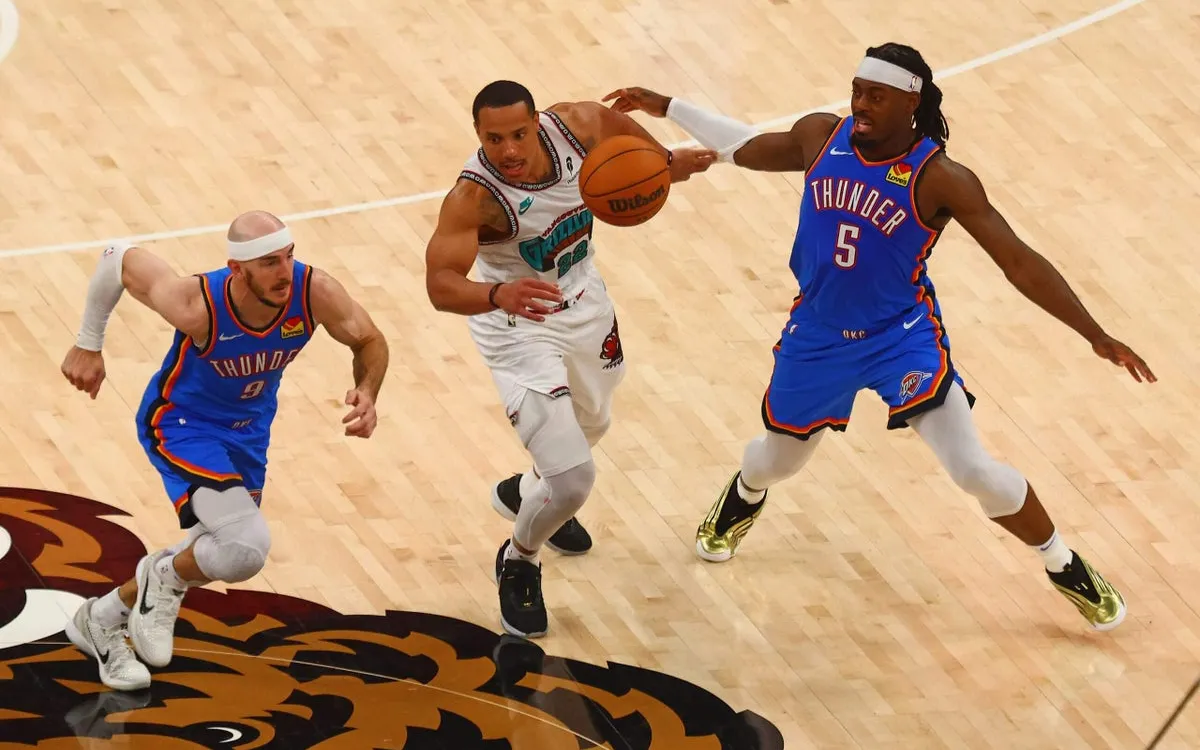
The NBA postseason has showcased some thrilling trends, particularly with the Oklahoma City Thunder, who have discovered a new level of intensity and strategy. In a stunning turn of events, the Thunder overcame a daunting 29-point deficit against the Memphis Grizzlies, taking a commanding 3-0 lead in their playoff series. This remarkable comeback was fueled by an unexpected pairing of their elite defenders, Alex Caruso and Lu Dort, who transformed the flow of the game.
Historically, Caruso and Dort have been utilized separately during games to ensure that the Thunder always had a top-tier point-of-attack defender on the court. Coach Mark Daigneault typically staggered their playtime. However, in Game 3, he decided to unleash both of them simultaneously during the fourth quarter, resulting in a defensive onslaught that left the Grizzlies floundering, especially after Ja Morant sustained a hip injury in the second quarter.
Dort, who ranked fourth in the Defensive Player of the Year voting, and Caruso, who would have likely received defensive accolades if eligible, showcased their formidable skills. Caruso, known for averaging more deflections per minute than any other player, including standout Dyson Daniels, proved invaluable in dismantling the Grizzlies' offensive strategies.
During the crucial moments of the fourth quarter, the Thunder's defense reached new heights. The Grizzlies, particularly Desmond Bane, struggled to find effective shots. Bane, who was expected to step up in Morant's absence, finished the game with a disappointing 3 for 11 shooting performance and four turnovers. Meanwhile, Caruso's relentless defense on probable All-NBA player Jaren Jackson Jr. demonstrated the Thunder's ability to disrupt even the most talented players.
The Thunder's defensive strategy is not just about individual brilliance; it involves seamless communication and the ability to switch effectively. The team's adaptability allows them to go big or small depending on the situation, utilizing players like Chet Holmgren and Isaiah Hartenstein strategically. Their defensive versatility makes it challenging for opponents to establish any rhythm.
The current NBA playoffs have brought back a level of physicality not seen in recent seasons. The atmosphere in arenas resembles the gritty basketball of the 1990s, with players engaging in fierce battles on the court. Series like the Houston Rockets versus the Golden State Warriors have turned into physical confrontations, reminiscent of wrestling matches.
Players are exhibiting more aggression, with numerous incidents highlighting this shift. From Kristaps Porziņģis shooting free throws while bleeding to scuffles involving Paul Reed and Mitchell Robinson, the playoffs have become a stage for intense physical contests. This emphasis on physicality is evident in the number of players hitting the floor, as teams have ramped up their efforts to secure loose balls and dominate the paint.
Statistics reveal a significant increase in player falls during the playoffs compared to the regular season. The Philadelphia 76ers, who led the league in falls per game during the regular season, are now being outpaced by several playoff teams. The Pistons and Knicks are at the forefront, averaging 26.0 and 25.7 falls per game, respectively, highlighting the intensity of their series.
As teams scramble for loose balls, the Knicks have increased their effort from an average of 1.5 loose balls per game during the regular season to an impressive 5.5 in the playoffs. Similarly, the Pistons have ramped up their efforts, showcasing the heightened stakes of playoff basketball.
The ongoing NBA playoffs have shed light on the evolution of the game, with teams like the Oklahoma City Thunder redefining defensive strategies and showcasing unparalleled physicality. As the postseason progresses, it is clear that the combination of elite defensive play and increased aggression will be crucial for teams aiming for championship glory. With the return of playoff bullies, fans can expect thrilling matchups and intense basketball in the days to come.